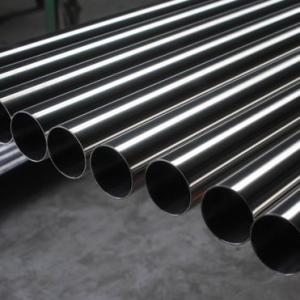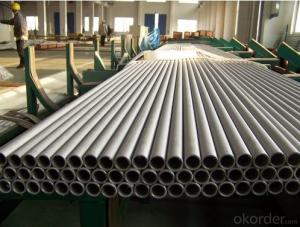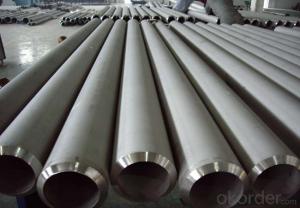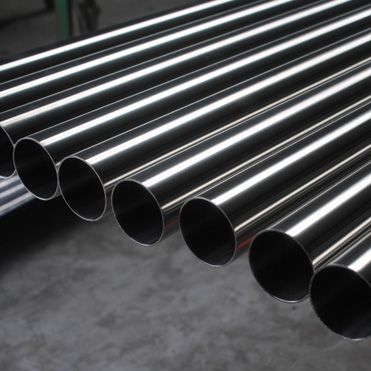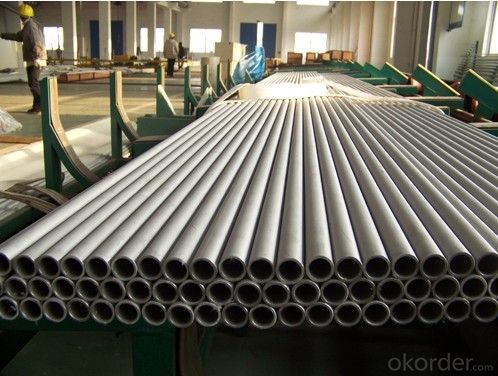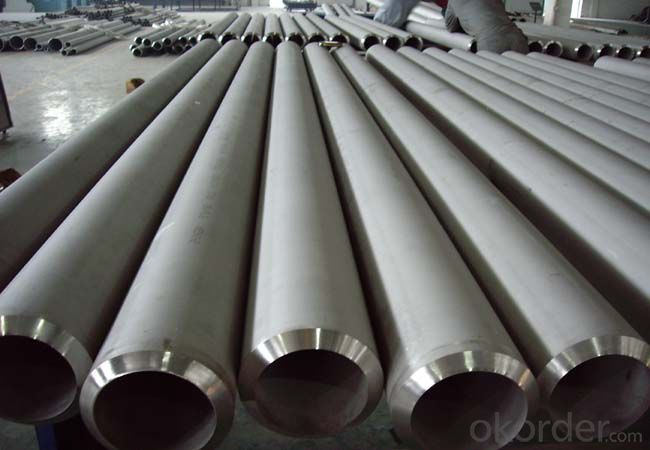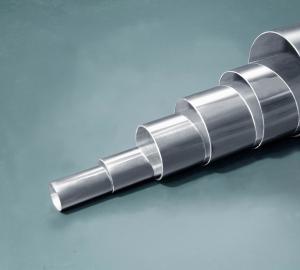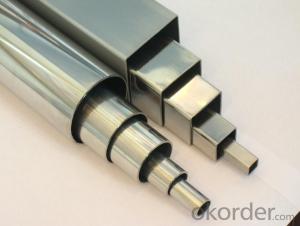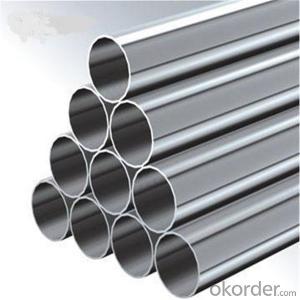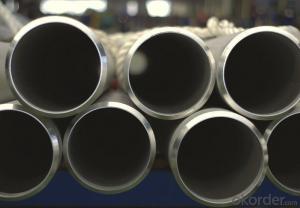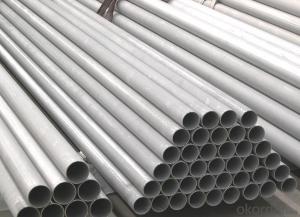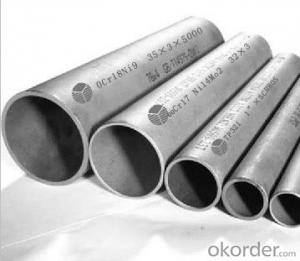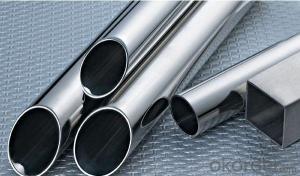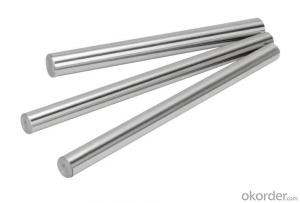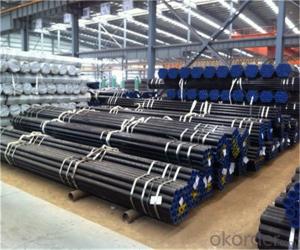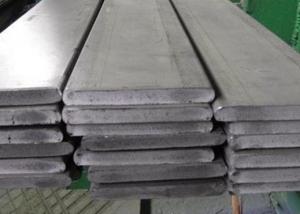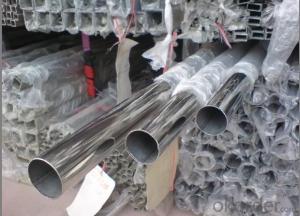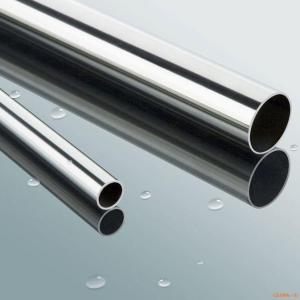Austenitic Seamless Steel Pipe Good Corrosion Resistance 304(0Cr18Ni9)
- Loading Port:
- Ningbo
- Payment Terms:
- TT OR LC
- Min Order Qty:
- 1 m.t.
- Supply Capability:
- 5000 m.t./month
OKorder Service Pledge
OKorder Financial Service
You Might Also Like
1、Structure of seamless steel pipe 304 Description:
A large amount of Seamless Steel Pipes 304 are offered to the clients at cost effective rates. These pipes are extremely durable, resistant to corrosion and have high tensile strength. Our pipes are used in nuclear plants, power plants, refineries and construction industry across the country. Furthermore, we are capable of providing these seamless pipes to the clients in bulk quantity.
2、Main Features of the seamless steel pipe 304:
• High manufacturing accuracy
• High strength
• Small inertia resistance
• Strong heat dissipation ability
• Good visual effect
•Reasonable price
3、seamless steel pipe 304 images:
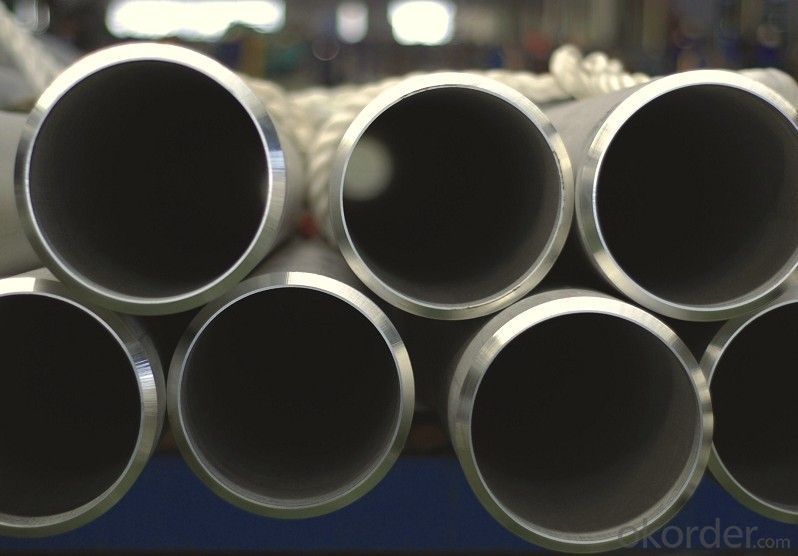
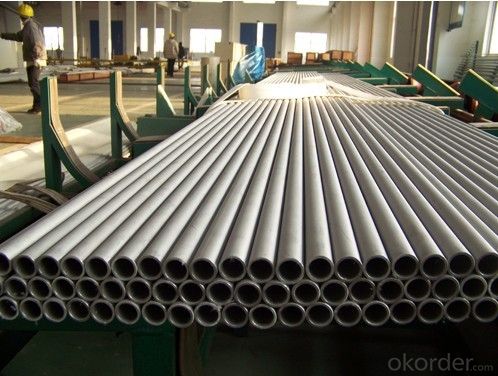
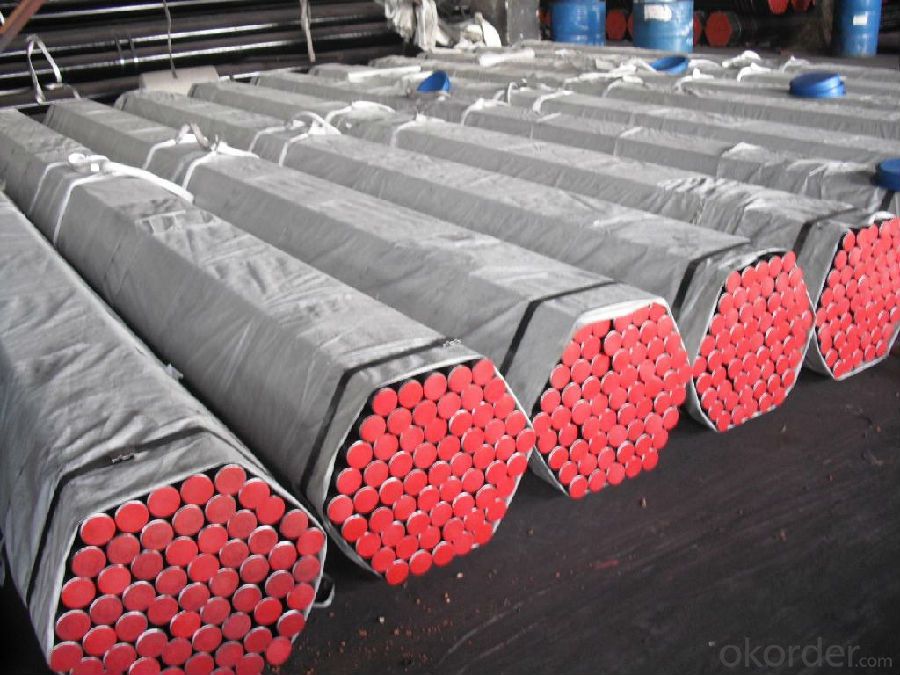
4、seamless steel pipe 304 Specification:
1.Type:seamless
2.Standard:ASTM
3.Material Grand:304 stainless steel
4.Size:OD8-1000MM*WT0.5-80MM
Standard: | JIS, AISI, ASTM, GB, DIN, EN | Place of Origin: | Zhejiang China (Mainland) | Brand Name: | SR |
Type: | Seamless | Steel Grade: | 300 Series | Certification: | ISO |
Thickness: | 0.8mm--22mm | Outer Diameter: | 20mm--800mm | process: | Cold drawn,cold roll |
product: | seamless pipe/tube,elbow,tee,reducer | MOQ: | 1000kg | standard: | A312/A213/A269/A249/A358/A268/A789/ |
Packaging & Delivery
Packaging Detail: | Standard seaworthy package(wooden boxes package,pvc package, and other package) |
Delivery Detail: | 5-30 days after confirmation of prepayment depending on quantity |
Tolerance | a) Outer Diameter: +/- 0.2mm b) Thickness: +/- 0.02mm c) Length: +/- 5mm |
Surface | 180G, 320G, 400G Satin / Hairline 400G, 500G, 600G or 800G Mirror finish and so on. |
Specification | ASTM A213,ASTM A312,ASTM A269,ASTM A778,ASTM A790,DIN 17456,DIN 17458,JIS G3459,JIS G3463 etc |
Material | TP304,TP304L,TP304H,TP304/304L,TP316,TP316L,TP316/316L,TP310,TP317, TP317L,TP321,TP321H,TP347,TP347H,S31803,S32205(Duplex),904L etc |
Application range | Stainless steel pipe applies to construction field, ships building industry, petroleum & chemicalindustries, war and electricity industries,food processing and medical industry, boiler heat exchanger,machinery andhardware fields. Stainless steel pipe can be made accordingto the customers requirements. |
Delivery conditions | Annealed, pickled & polished. |
Note | We can produce other standard as the customers’ requirement. |
5、FAQ of seamless steel pipe 304:
①How is the quality of your products?
Our products are manufactured strictly according to national and internaional standard, and we take a test
on every pipe before delivered out. If you want see our quality certifications and all kinds of testing report, please just ask us for it.
Guaranteed: If products’ quality don’t accord to discription as we give or the promise before you place order, we promise 100% refund.
②How about price?
Yes, we are factory and be able to give you lowest price below market one, and we have a policy that “ for saving time and absolutely honest business attitude, we quote as lowest as possible for any customer, and discount can be given according to quantity”,if you like bargain and factory price is not low enough as you think, just don’t waste your time.Please trust the quotation we would give you, it is professional one.
③Why should you chose us?
Chose happens because of quality, then price, We can give you both.Additionally, we can also offer professional products inquiry, products knowledge train(for agents), smooth goods delivery, exellent customer solution proposals.Our service formula: good quality+good price+good service=customer’s trust
SGS test is available, customer inspection before shipping is welcome, third party inspection is no problem.
Any question, pls feel free to contact us !
- Q: What are the disadvantages of using stainless steel pipes?
- Some potential disadvantages of using stainless steel pipes include their higher cost compared to other materials, their susceptibility to corrosion under certain conditions, and the difficulty of welding and shaping them. Additionally, stainless steel pipes may be prone to scratching or denting, and they can be less resistant to certain chemicals or extreme temperatures compared to other materials.
- Q: Can stainless steel pipes be used for steam piping?
- Yes, stainless steel pipes can be used for steam piping. Stainless steel is highly resistant to corrosion and can withstand high temperatures, making it an excellent choice for steam applications where durability and longevity are important.
- Q: Can stainless steel pipes be passivated?
- Yes, stainless steel pipes can be passivated. Passivation is a chemical process that is used to remove free iron and other contaminants from the surface of stainless steel pipes. This process is important as it helps to enhance the corrosion resistance of the stainless steel and improve its overall performance. Passivation is typically carried out by immersing the stainless steel pipes in an acid solution or applying a chemical solution to the surface. The solution helps to remove any impurities or contaminants from the surface, leaving a clean and corrosion-resistant layer. Passivation is commonly used in industries such as food and beverage, pharmaceuticals, and oil and gas, where stainless steel pipes are extensively used.
- Q: What is the difference between inside diameter and outside diameter in stainless steel pipes?
- Inside diameter (ID) and outside diameter (OD) are two important measurements used to describe the dimensions of stainless steel pipes. Inside diameter refers to the measurement of the innermost part of the pipe, which is the hollow space where fluids or gases flow. It is typically measured in millimeters or inches. The ID is crucial for determining the flow capacity of the pipe and is commonly used in calculations related to fluid dynamics and pressure drop. On the other hand, outside diameter refers to the measurement of the outermost part of the pipe, including the thickness of the pipe walls. It is also measured in millimeters or inches. The OD is essential for determining the overall size and strength of the pipe. It is often used in calculations related to pipe fittings, support requirements, and compatibility with other components or systems. In stainless steel pipes, the difference between the inside diameter and outside diameter is the thickness of the pipe walls. This thickness is necessary to provide structural integrity and resist external forces, such as pressure and temperature. The ratio between the inside diameter and outside diameter, known as the wall thickness, plays a significant role in determining the pipe's strength and suitability for specific applications. In summary, the inside diameter refers to the measurement of the inner part of the stainless steel pipe, while the outside diameter refers to the measurement of the outer part, including the thickness of the pipe walls. Understanding these two measurements is crucial for selecting the right pipe size, calculating flow capacity, and ensuring the pipe's overall suitability for the intended application.
- Q: How do you calculate the pressure drop in stainless steel pipes?
- To calculate the pressure drop in stainless steel pipes, you would need to consider various factors such as the flow rate, pipe diameter, pipe length, and the properties of the fluid being transported. The pressure drop can be determined using the Darcy-Weisbach equation, which is commonly used for calculating pressure losses in pipe systems. The Darcy-Weisbach equation is as follows: ΔP = (f * (L/D) * (ρ * V^2))/2 Where: ΔP = Pressure drop (in units of force per unit area, such as psi or Pa) f = Darcy friction factor (depends on flow conditions and pipe roughness) L = Pipe length (in units of length, such as meters or feet) D = Pipe diameter (in units of length, such as meters or feet) ρ = Fluid density (in units of mass per unit volume, such as kg/m^3 or lb/ft^3) V = Fluid velocity (in units of length per unit time, such as m/s or ft/s) To calculate the pressure drop, you would need to determine the Darcy friction factor, which depends on the Reynolds number (Re) and the relative roughness of the pipe. The Reynolds number can be calculated using the following equation: Re = (ρ * V * D)/μ Where: μ = Fluid viscosity (in units of force per unit area per unit time, such as Pa·s or lb/ft·s) Once you have determined the Reynolds number, you can use empirical correlations or Moody's chart to find the Darcy friction factor for the given flow conditions. With the friction factor, pipe length, diameter, fluid density, and velocity, you can then calculate the pressure drop using the Darcy-Weisbach equation. It is important to note that the above equations provide an approximate calculation of pressure drop in stainless steel pipes. The accuracy of the calculation may depend on factors such as pipe roughness, fluid properties, and the flow regime. Additionally, it is recommended to consult relevant standards or engineering references for more detailed and accurate calculations.
- Q: Can stainless steel pipes be used for offshore oil rigs?
- Yes, stainless steel pipes can be used for offshore oil rigs. Stainless steel is a highly durable and corrosion-resistant material, making it suitable for offshore environments that are exposed to harsh conditions such as saltwater and extreme temperatures. The corrosion resistance of stainless steel ensures the longevity and integrity of the pipes, reducing the risk of leaks or failures in the oil rig's infrastructure. Additionally, stainless steel pipes have excellent mechanical properties, which allow them to withstand high pressures and maintain structural integrity, making them a reliable choice for offshore oil rigs.
- Q: How do you prevent stress corrosion cracking in stainless steel pipes?
- To prevent stress corrosion cracking in stainless steel pipes, several precautions can be taken: 1. Material selection: Choose a stainless steel grade that is resistant to stress corrosion cracking. Austenitic stainless steel grades such as 304 and 316 are commonly used due to their high resistance to corrosion and cracking. 2. Proper fabrication and welding: Ensure that the welding procedures used during fabrication are suitable for stainless steel and minimize the introduction of residual stresses. This includes using proper welding techniques, maintaining appropriate heat input, and employing post-weld heat treatment if necessary. 3. Avoid exposure to corrosive environments: Protect stainless steel pipes from exposure to aggressive chemicals, high chloride concentrations, and other corrosive substances. Regularly inspect the environment and take necessary measures to prevent contact between the pipes and corrosive agents. 4. Control operating conditions: Avoid subjecting stainless steel pipes to excessive tensile stresses or temperatures that can promote stress corrosion cracking. This can be achieved by maintaining proper operating conditions, such as controlling pressure, temperature, and flow rates within the recommended limits. 5. Regular inspection and maintenance: Conduct regular inspections to identify any signs of stress corrosion cracking. This may include visual inspections, non-destructive testing techniques (e.g., ultrasonic testing), or corrosion monitoring. If any signs of stress corrosion cracking are detected, immediate action should be taken to repair or replace the affected pipe sections. 6. Proper cleaning and maintenance: Keep stainless steel pipes clean and free from contaminants that can accelerate corrosion. Regular cleaning and maintenance practices should be followed, including removing any deposits or foreign materials that may promote stress corrosion cracking. Overall, preventing stress corrosion cracking in stainless steel pipes requires a combination of proper material selection, fabrication techniques, environmental control, regular inspections, and appropriate maintenance practices. By implementing these measures, the risk of stress corrosion cracking can be significantly reduced, ensuring the longevity and reliability of stainless steel pipes.
- Q: Can stainless steel pipes be threaded with NPT threads?
- Indeed, NPT threads can be applied to stainless steel pipes. NPT, a prevalent standard for pipe threads in the United States, is compatible with stainless steel as well as various other materials. Nevertheless, it is crucial to acknowledge that stainless steel possesses greater strength and hardness compared to alternative materials, necessitating increased caution and attentiveness during the threading procedure. Moreover, employing lubricants or cutting fluids specifically formulated for stainless steel is advised to guarantee a seamless and precise threading operation.
- Q: Can stainless steel pipes be pressure tested?
- Indeed, it is possible to subject stainless steel pipes to pressure testing. The purpose of pressure testing is to expose the pipes to elevated pressure levels, surpassing those encountered in regular operations, in order to verify their robustness and reliability. Stainless steel is renowned for its resilience and capacity to endure high-pressure circumstances, thereby rendering it fitting for pressure testing purposes. The procedure entails filling the pipes with either a liquid or gas and progressively escalating the pressure to the intended level, all the while vigilantly inspecting for any signs of leakage or malfunctions. To guarantee precise outcomes and avert potential dangers, it is imperative to adhere to proper protocols and safety precautions throughout the pressure testing process.
- Q: Can stainless steel pipes be embossed?
- Yes, stainless steel pipes can be embossed.
Send your message to us
Austenitic Seamless Steel Pipe Good Corrosion Resistance 304(0Cr18Ni9)
- Loading Port:
- Ningbo
- Payment Terms:
- TT OR LC
- Min Order Qty:
- 1 m.t.
- Supply Capability:
- 5000 m.t./month
OKorder Service Pledge
OKorder Financial Service
Similar products
Hot products
Hot Searches
Related keywords
